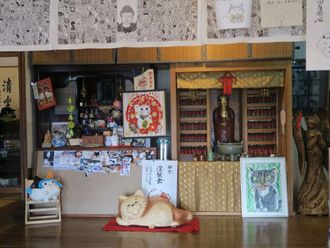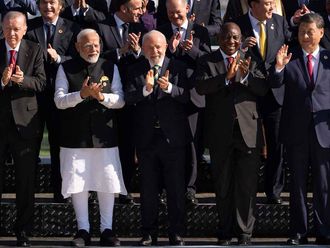Bangkok: Thai government officials huddled on Saturday to consider a peace overture by tens of thousands of protesters demanding elections in an increasingly deadly six-week street rally in Bangkok.
The red-shirted supporters of ousted former premier Thaksin Shinawatra said on Friday they will end a three-week occupation of Bangkok's ritzy shopping district if the government dissolved parliament and called elections in 30 days, softening a previous demand for immediate polls.
It was unclear whether the military-backed government of embattled Prime Minister Abhisit Vejjajiva would agree to that timetable. Analysts say he is running out of options after weeks of unrest by protesters who have gained a clear upper hand.
"The government might have to agree to a three-month timeframe, but this doesn't mean this will ease the tensions," said Pitch Pongsawat, a political scientist at Chulalongkorn University. "There doesn't seem to be any real control about what's been happening on the streets."
Thai government officials were meeting on Saturday to consider the red shirts offer after talks with protest leaders late on Friday.
Underscoring the tension, a series of grenade blasts killed one person and wounded 88 on Thursday in the heart of Bangkok's business district.
The risk of further violence remains high. Thousands of armed troops keep watch over red shirts at a city intersection. Royalist pro-government protesters often gather outside their barricade, sparking minor clashes.
Among their new demands, the red shirts want Abhisit to begin an independent probe into a clash that killed 25 people and wounded hundreds in a failed attempt to disperse the protesters on April 10, and for troops to withdraw from their protest site.
The demands came shortly after army chief Anupong Paochinda offered an olive leaf of his own, telling commanders there would be no crackdown on the protesters camped out in the capital because it would do more harm than good.
Tens of thousands of red shirts remain in a fortified encampment at a district of high-end department stores in central Bangkok, vowing to stay until parliament is dissolved.
Some doubt a shorter timeline for elections would end the increasingly violent conflict on Bangkok's streets.
A powerful backlash against the mostly rural and working-class red shirts is growing among Bangkok's royalist establishment who took to the streets on Friday holding placards reading "no dissolution".
The pro-government protesters, who call themselves "multi-coloured shirts", plan to rally again on Saturday.
If Abhisit caves in, those royalists who believe the red shirts want to topple Thailand's monarchy are likely to fight back with a vengeance. In 2008, they blockaded Bangkok's international airport, stranding at least 230,000 people until a court dissolved a pro-Thaksin ruling party for electoral fraud.
The violence and deepening political divide has spurred talk of civil war in Southeast Asia's second-biggest economy.
"The government is far from controlling the situation," top Thai broker Kim Eng Securities said in a client note on Friday.
Analysts say the protests are radically different from any other period of unrest in Thailand's polarising five-year political crisis -- and arguably in modern Thai history -- pushing the nation close to an undeclared civil war.
Diplomats and analysts say the army's middle ranks look dangerously split with one faction backing the protesters led by retired generals allied with Thaksin, who was ousted in a 2006 coup and later sentenced in absentia for corruption.
The red shirts say British-born and Oxford-educated Abhisit came to power illegitimately in December 2008, heading a coalition the military cobbled together after courts dissolved a pro-Thaksin party that led the previous government.












